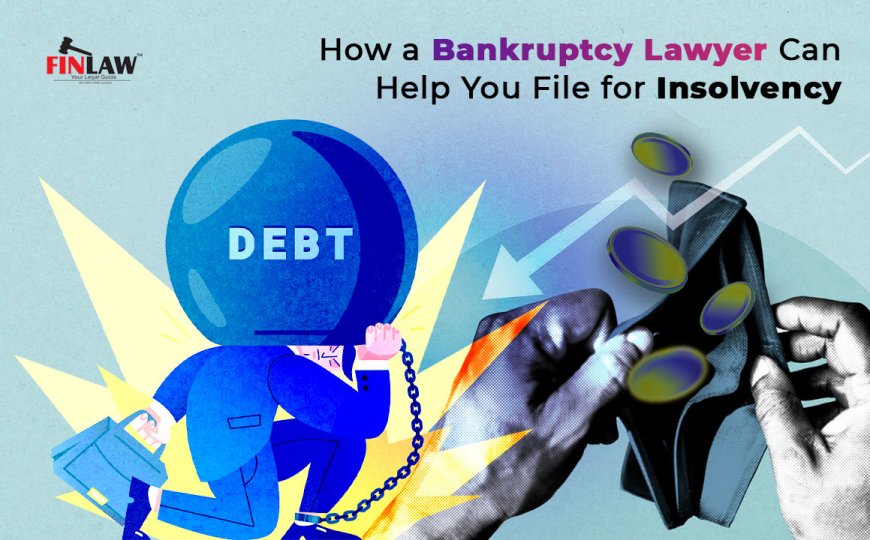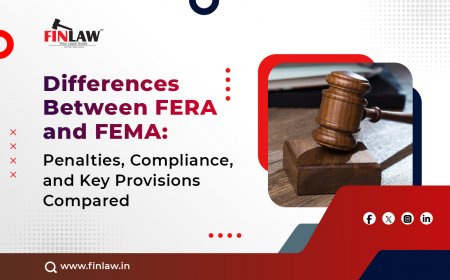How a Bankruptcy Lawyer Can Help You File for Insolvency in India
Find out how a bankruptcy lawyer in India can help you file for insolvency, protect your rights, and navigate complex IBC procedures. Expert legal insights inside.

Dealing with insolvency is never easy. It often comes with emotional stress, reputational risk, and legal complications. In India, the situation becomes even more challenging due to the technicalities of the Insolvency and Bankruptcy Code (IBC), 2016. Whether you’re an individual borrower, a startup founder, or a creditor trying to recover dues, hiring an experienced bankruptcy lawyer can significantly improve your chances of a favorable legal outcome.
In this comprehensive guide, we explain how a bankruptcy lawyer in India can guide you through every step of the insolvency process, protect your rights, and help you make informed financial decisions.
Understanding Bankruptcy and Insolvency in India
Bankruptcy and insolvency are often used interchangeably, but they have different legal meanings under Indian law.
-
Insolvency refers to the financial condition where a person or business cannot meet debt obligations on time.
-
Bankruptcy is a legal declaration of insolvency, usually applicable to individuals. In India, corporate insolvency is dealt with under the Corporate Insolvency Resolution Process (CIRP) as per the IBC.
A bankruptcy lawyer is trained to handle both types of cases and can help you understand your legal position before you initiate formal proceedings.
The Role of a Bankruptcy Lawyer in India
Here’s how a qualified bankruptcy lawyer can help you at various stages:
1. Case Evaluation and Pre-Litigation Advice
A bankruptcy lawyer performs a detailed review of your finances, liabilities, and assets. They assess:
-
Whether you qualify for insolvency under IBC
-
The best course of action: restructuring, settlement, or liquidation
-
Potential legal consequences and rights under Indian law
This initial analysis helps avoid unnecessary litigation.
2. Drafting and Filing Insolvency Petitions
The lawyer will prepare your:
-
Application under Section 7, 9, or 10 (for corporate debtors or creditors)
-
Application under Part III of IBC (for individuals and partnership firms)
Incorrectly drafted petitions are a leading cause of rejection by NCLT or DRT, which a lawyer helps prevent.
3. Court Representation in NCLT and DRT
Your bankruptcy lawyer appears on your behalf at:
-
National Company Law Tribunal (NCLT) for corporate insolvency
-
Debt Recovery Tribunal (DRT) for personal insolvency
They argue your case, respond to creditor objections, and ensure compliance with procedural rules.
4. Coordinating with Insolvency Resolution Professionals (IRPs)
Once your petition is admitted, the court appoints an IRP. Your lawyer:
-
Liaises with the IRP
-
Verifies creditor claims
-
Protects your interests during asset evaluation and resolution plan preparation
Key Legal Concepts Every Debtor Should Know
To better understand the legal process, here are some essential terms explained by bankruptcy lawyers:
|
Legal Term |
Explanation |
|
Moratorium |
Legal stay on all recovery actions once insolvency begins |
|
Resolution Plan |
A proposal for reviving the company or settling personal debts |
|
Liquidation |
Sale of assets to pay off creditors |
|
CoC (Committee of Creditors) |
Group of financial creditors who decide the fate of a company in CIRP |
|
Fresh Start Process |
A debt waiver scheme under IBC for individuals with limited income and debt |
Common Situations Where Bankruptcy Lawyers Are Essential
A bankruptcy lawyer in India is indispensable in the following real-world scenarios:
- When a startup defaults on investor or vendor payments
- When a personal guarantor is sued by a bank after a corporate default
- When an MSME business wants to settle debts but avoid liquidation
- When creditors initiate IBC proceedings and you need to defend yourself
- When there is a dispute among creditors or challenges in the resolution plan
How to Choose the Right Bankruptcy Lawyer in India
With multiple NCLT benches and evolving case laws, finding a competent bankruptcy lawyer is crucial. Here’s what to consider:
-
Proven experience with IBC filings and NCLT hearings
-
Up-to-date knowledge of IBC amendments and circulars
-
Strong drafting and negotiation skills
-
Familiarity with insolvency tools such as OTS, restructuring, and out-of-court settlements
-
Transparent billing model and documented client references
Documents Required by Your Bankruptcy Lawyer
Before starting your case, you’ll need to share the following:
-
PAN, Aadhaar, and business registration documents
-
Last 3–5 years’ ITR and financial statements
-
List of creditors with contact details and amounts
-
Loan agreements, default notices, and bounced cheques (if applicable)
-
Any prior litigation records or arbitration awards
Your bankruptcy lawyer will review, verify, and organize these to support your application.
Updated Legal Trends and Statistics (2024–2025)
-
According to IBBI data, over 7,000 corporate insolvency cases have been admitted since 2016.
-
Nearly 48% of cases ended in liquidation, while around 15% were resolved with an approved resolution plan.
-
In a growing trend, personal guarantors of defaulting companies are being actively pursued by creditors.
These figures underline the importance of seeking expert legal counsel when dealing with insolvency. A bankruptcy lawyer helps you avoid liquidation or personal liability wherever possible.
Common Mistakes That a Bankruptcy Lawyer Helps You Avoid
-
Filing the wrong petition (e.g., as operational creditor instead of financial creditor)
-
Missing crucial deadlines under IBC (e.g., submitting claims or resolution plans late)
-
Providing incomplete financial disclosure
-
Overlooking cross-border claims or foreign creditors
-
Misinterpreting moratorium protections
Even a minor error can lead to case dismissal, asset loss, or prolonged litigation.
The Value of a Bankruptcy Lawyer for Creditors
If you’re a creditor, especially a small business, NBFC, or investor, hiring a bankruptcy lawyer helps you:
-
Initiate timely insolvency proceedings
-
Safeguard your place in the waterfall mechanism
-
Block fraudulent transfers of assets by the debtor
-
Participate actively in CoC decisions
-
Maximize recovery from resolution or liquidation
Alternatives Your Bankruptcy Lawyer Might Suggest
Not every insolvency case needs to end in court. Your lawyer might recommend:
-
Out-of-court settlement with creditors
-
Debt restructuring through RBI frameworks
-
Arbitration under commercial contracts
-
Pre-pack insolvency resolution (for MSMEs)
These alternatives may be faster, cheaper, and less damaging to reputation.
Conclusion
Filing for bankruptcy is not just a financial decision—it’s a legal strategy that can reshape your future. With India’s complex legal ecosystem, hiring a qualified bankruptcy lawyer is more than just an option; it’s a necessity.
From filing petitions to negotiating settlements and protecting your rights, your bankruptcy lawyer is your legal lifeline during financial distress. Don't wait for court notices or creditor lawsuits. If your debts are spiraling out of control, consult a bankruptcy lawyer in India today—and take the first step toward financial recovery.
Frequently Asked Questions (FAQs)
Q1. Is bankruptcy the same as insolvency in India?
No. Insolvency is a financial state; bankruptcy is a legal process. A bankruptcy lawyer helps you transition from one to the other legally.
Q2. Can small businesses in India file for bankruptcy?
Yes, especially if they are registered as companies or LLPs. MSMEs can also use pre-packaged insolvency schemes.
Q3. What if creditors reject my resolution plan?
Your bankruptcy lawyer can revise and resubmit the plan, or prepare you for liquidation proceedings if necessary.
Q4. Is hiring a bankruptcy lawyer mandatory for IBC filings?
Not mandatory, but strongly recommended. Errors in filing or court procedures can derail your case entirely.
What's Your Reaction?



















